Pao Alumni Story Series 02
Augustine is entering his junior year at the University of Notre Dame this fall. He majors in Chinese, which is an academic interest that can be traced back to his high school years.
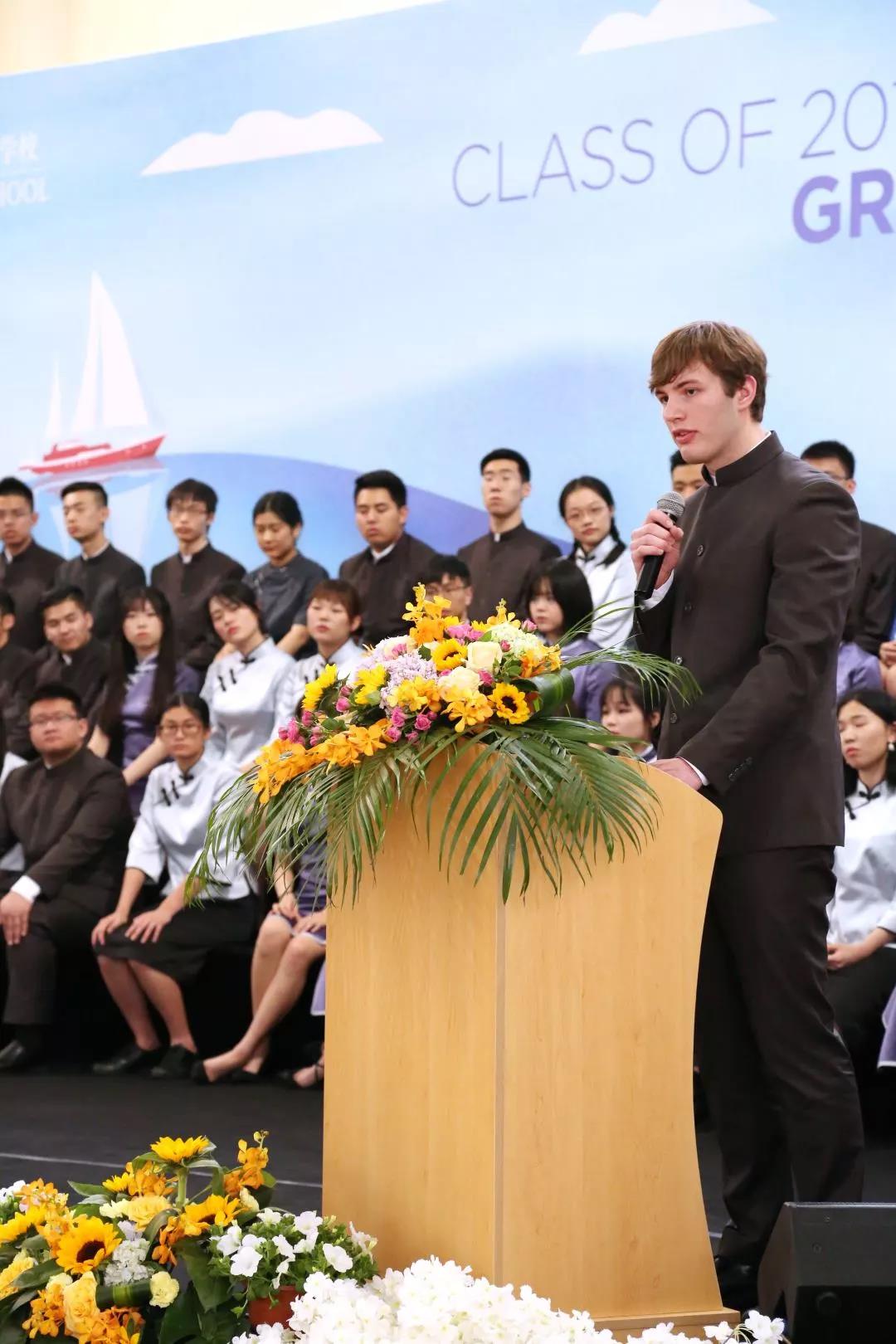
Augustine spoke at his graduation ceremony, 2017
It isn't often that one takes a campus tour at 5 in the morning but that's exactly what Augustine did when he visited YK Pao School in October 2013. With a flight to catch at 8 that morning, he and his family arranged a last-minute tour of Pao School's Songjiang campus. Then Secondary Division Executive Principal Tony Jaccaci met Augustine and his family at the front entrance literally at the crack of dawn so that they could see the campus before they hopped on their flight home to Chicago.
Mr. Jaccaci told me that coming to Pao School would test my limits, but that I would be a better person for it.
——Augustine
Pao School: right place, right time
Augustine's roots are international. He spent most of his childhood in Hong Kong before moving to a small town in the Chicago suburbs. After living there two years, at the age of 15, he wanted a change of pace. He planned to enroll in an immersive Chinese language programme.
“I had become enthralled with the Chinese language and culture. I wanted to take my Chinese studies to the next level, so I thought why not go straight to the source?" Augustine says.
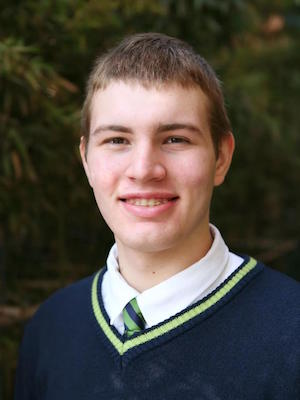
10th grade Augustine in Pao School uniform
The only issue he faced was finding the right school in China. Initially, he figured a local school would be his best bet - it would be possible to immerse himself in the Chinese language. But he soon realized he had limited options. It wasn't a given for Chinese students and non-Chinese students to take the same classes together. If he was separated from the Chinese students, he knew his Chinese ability would suffer.
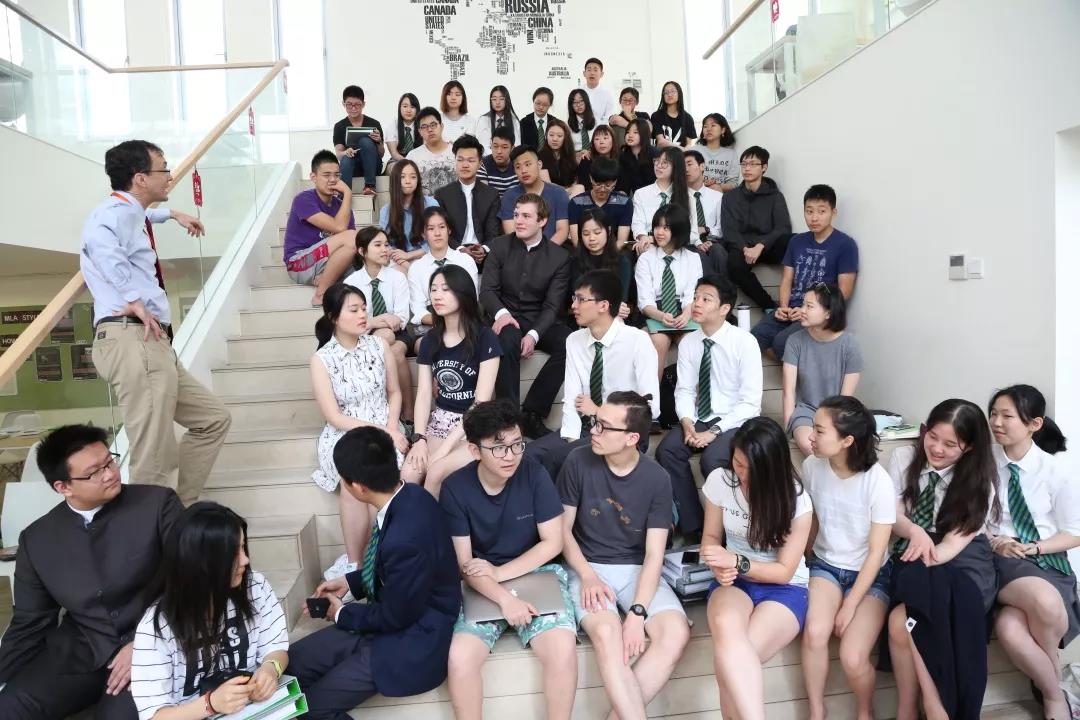
Mr. Jaccaci (left) with the class of 2017
That's where YK Pao School came in. Thanks to a family friend's introduction, Augustine met Mr. Jaccaci, who gave him a full tour of Pao School's Songjiang campus.
“I was impressed that he gave me a personal tour of the campus so early in the morning," Augustine says. "I could feel his enthusiasm for Pao School, and it won me over."
The introduction of the school aligned perfectly with Augustine’s vision for his education in China. He decided to enroll in Pao School.
Adapting to life at Pao School
One year after that early-morning tour, Augustine arrived on campus for his first day of class and immediately had to contend with some challenges. He stood out for both his considerable height and his different cultural background.
Aware that there would be a steep learning curve, Augustine vowed to get involved in as many campus activities as possible. Sports were among the most important for his adjustment to life at Pao School and integration into our community. During daily Co-curricular Activities (CCA) from years 10-12, he participated in swimming, soccer, basketball, weightlifting, cycling, and Tae-kwon-do.
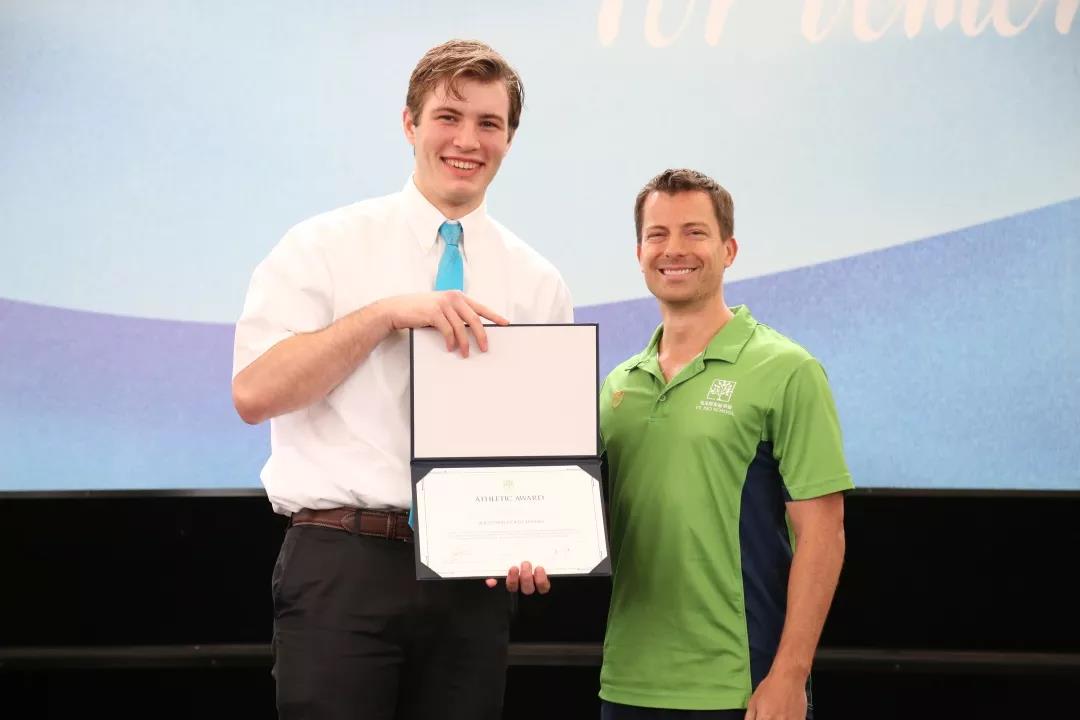
Augustine received the Athletic Award in the 12th grade
His closest group of friends were the “seven-day boarders," the students who lived on campus all seven days of the week as he did. When other students left for the weekend, they hung out together. Today, they remain close friends even though they live in many different locations across the United States.
I was expecting to only stay for one year, but the friendships I made convinced me to come back for my junior and senior year.
——Augustine
It wasn't just classmates who made a lasting impression on Augustine. Augustine remembers his Pao teachers fondly, especially Lisa, who teaches economics. He describes her as “the best economics teacher and educator” he has ever met. He recalls that the class was challenging in the best way, allowing students to realize the rewards of pursuing knowledge.
Pao teachers also played a positive role for Augustine outside of the classroom. In terms of life in general, “Mrs. Jaccaci was like my mom for that first year. She really took care of me and made sure that I was doing well,” he says.
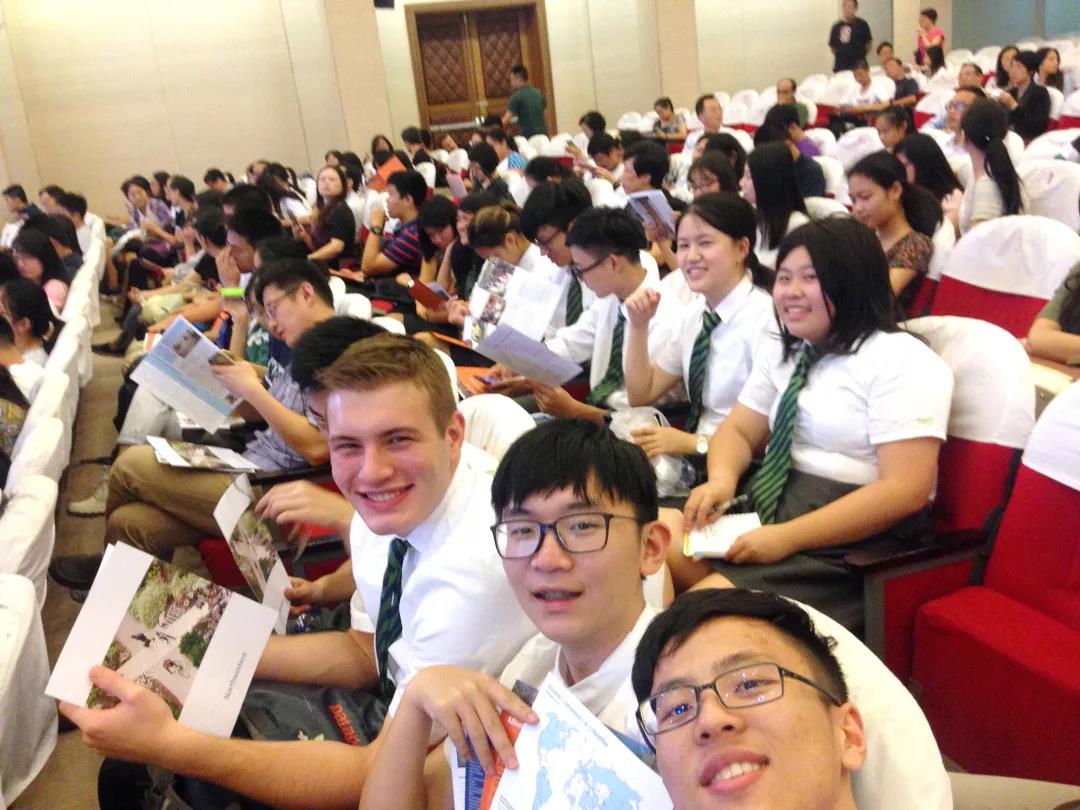
Augustine attends a university intro session with friends
Immersive & intensive Chinese
When Augustine arrived on campus, he was the only student in his class who could not speak Chinese fluently. He was in a three-person IB Chinese Standard Level class with two other students, both fluent Chinese speakers who were learning how to read and write.
Augustine admits that he wasn't prepared for the intensity of the class, but as a result, his Chinese level improved rapidly. “The class was remarkably effective," recalls Augustine.
When the class began, I could barely speak any Chinese and by the time it ended, I was proficient. I think it says a lot about (her teaching).
——Augustine
Augustine says that the most valuable aspect of IB Chinese was how he learned to listen to Chinese at the same pace as native speakers. He eventually didn't need the teacher to slow down in order for him to follow what she was saying. Studying Chinese in college, he found that many of his classmates struggle to understand what the professor is saying.
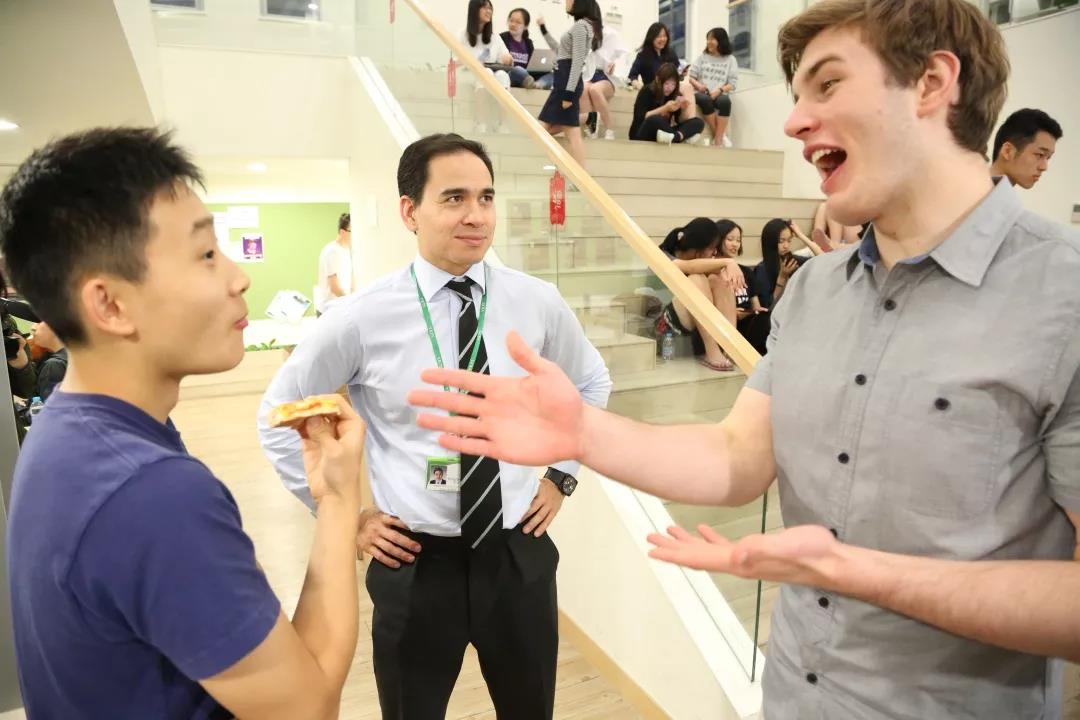
Augustine (right first) at a pizza party
In an interview with Pao School, Augustine’s father said that he saw his son grew tremendously both academically and socially during his time at the school.
The environment was both supportive and competitive. It really raised the bar for him academically. He benefited hugely from that.
——Augustine's father
Since the Songjiang campus is not in downtown Shanghai, where there are many proficient English speakers, Augustine had the chance to speak a lot of Chinese when he interacted with locals near campus. Nonetheless, when he wanted to visit Shanghai's downtown, he could get there in less than an hour on the subway. For him, studying at Pao School was a rich experience: He was able to both learn the Chinese language and explore Shanghai, one of the world's great cities.
Chinese major on the global stage
While IB Chinese provided Augustine with a solid foundation, he learned how to chat like a native from speaking with his Chinese friends. Learning colloquial terms absent from the classroom inspired him to take his Chinese studies to the next level.
Now, as a Chinese major at the University of Notre Dame, Augustine is one of the university’s International Ambassadors, responsible for welcoming new students from all over Asia. He also plans to write his senior thesis about Chinese internet slang.
“When I was at Pao School, I got a letter from the University of Notre Dame that was hand-written in Chinese congratulating me (for getting in),” remembered Augustine. “Now I am the person who writes those letters. ”
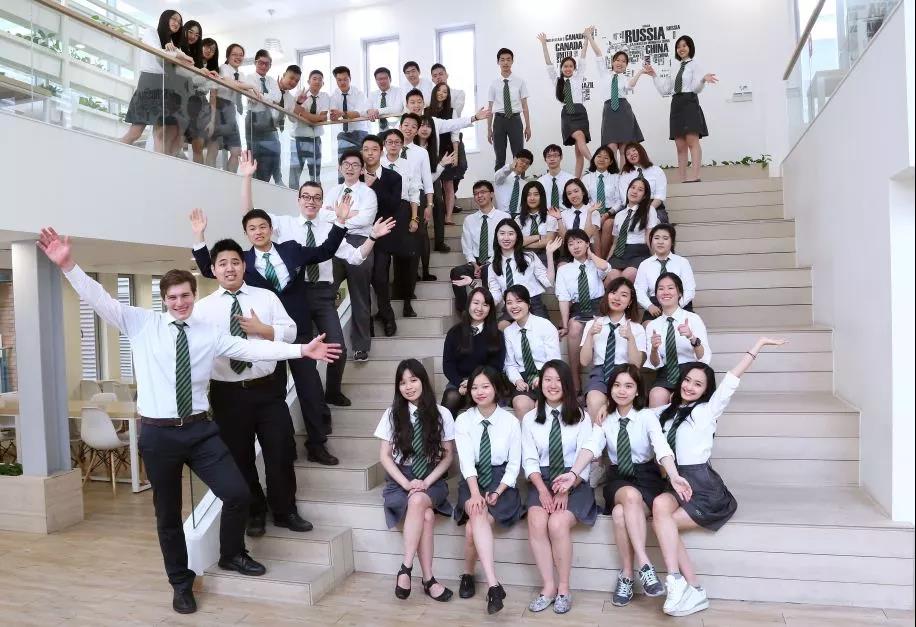
The first class to graduate from YK Pao High School
Augustine is also an honors student (equals one minor) with minors in four disciplines: business, economics, real estate, and German. “I am actually the first student to have ‘broken the system’ because of the (number of) minors that I take,” said Augustine.
Augustine is doing more than just keeping his options open. He is currently working on the application for the Schwarzman Scholars at Tsinghua University, a fellowship opportunity that admits 200 scholars every year. Not surprisingly, this programme brings together a “network of leaders who will serve as bridges between China and the rest of the world.”
As a member of the first graduating class, as well as the first international graduate from YK Pao, Augustine attributes a great deal of his academic competitiveness to the curriculum offered in Songjiang.
IB prepared me for university-level coursework and beyond. The IB programme is tough but phenomenal.
——Augustine
Advice from alumni
The biggest difference between high school and college is the freedom one has at college. Augustine explains that while the course materials in college are not too hard compared to the IB curriculum, the amount of the work, as well as the ample free time given to students, can make academics challenging.
“In college, you don’t have a schedule planned out for you like the one you have at Pao School. You are on your own and you have to figure it all out by yourself,” said Augustine. “What you really need are good time management skills.”